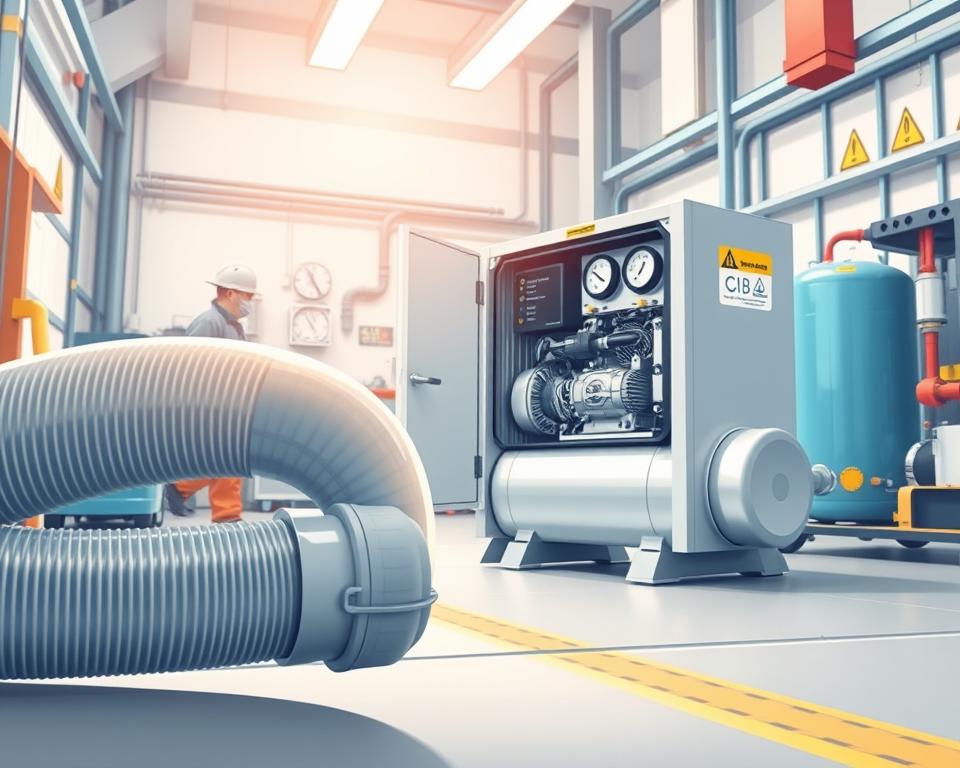Your Complete Guide to PVC Pipe in Compressed Air Systems
Did you know that a ruptured compressed air system can release energy equivalent to a stick of dynamite? Despite the hazards, numerous workshops continue installing piping systems from unsafe materials. Read on to discover why PVC pipe for air compressor lines choices demand top-tier safety.
Although some plastics gain popularity, OSHA flatly forbids their above-ground application. Oil contact and repeated temperature swings degrade these pipes, risking sudden ruptures. Those so-called safe pressure limits don’t eliminate explosion risk.
Turn to Installation Parts Supply for sturdy aluminum systems. Spending on the right materials prevents OSHA penalties and protects employees. Let’s explore how to build a safer system.

Core Insights
- OSHA prohibits specific piping for air lines because of blast hazards.
- Temperature changes can halve pressure ratings.
- Brittleness worsens over time, increasing failure risks.
- Aluminum lines deliver a far safer option.
- Proper investment prevents costly fines and accidents.
Why You Shouldn’t Use PVC for Compressed Air
All major brands advise against certain plastics in compressed air. Unlike water, compressed air stores explosive energy—a ruptured line can release force comparable to dynamite. Material selection is the linchpin of air-system safety.
- Brittleness: Sub-freezing temperatures turn materials brittle, increasing fracture risks.
- Adhesive failures: Joints weaken when exposed to compressor oils or temperature swings.
- Misleading ratings: Pressure capacity drops 50% at 110°F—most workshops exceed this.
OSHA cites a $110,000 fine after a facility’s piping shattered, injuring workers. The “heat of compression” further reduces safe operating limits, a factor often overlooked in ratings.
“Above-ground use of certain plastics for compressed air violates OSHA standards due to explosion risks.”
Steel and aluminum curve under stress instead of shattering. PVC shards fly far and fast, causing collateral damage.
Workshops face daily temperature fluctuations that accelerate material degradation. Over 10 years, UV exposure and chemical interactions further compromise integrity, turning minor leaks into major hazards.
Safe Alternatives to PVC Pipe for Air Compressor Lines
Modern aluminum systems beat old-school piping on both safety and performance. They leak 90% less than black iron, making them ideal for today’s shops. Their lightweight design and corrosion resistance make them ideal for long-term use.
Snap-together modular aluminum cuts installation hours. Installation Parts Supply stocks ready-to-snap aluminum modules. One auto factory trimmed labor hours by 40% via aluminum retrofits.
- Copper: Best for cleanrooms due to natural antimicrobial properties. Requires soldering expertise.
- Stainless Steel: Resists rust in humid areas like coastal workshops.
- ABS/HDPE: For solvent-rich environments, ABS/HDPE stays intact.
“Our aluminum retrofit reduced energy waste by 15%—paying for itself in 18 months.”
Proper torque is critical. Cracks from overtightening and leaks from under-tightening are common. Aluminum fittings generally torque to 25–30 ft-lbs—follow the guide.
Use NSF-certified materials when air quality is critical. Pick piping suited to your facility’s conditions.
How to Choose the Right Piping Material for Your Needs
Consider cost, compliance, and efficiency in your pipe decision. Switching to aluminum saved a factory $12k each year. Follow these tips to pick wisely.
| Material | Cost (per ft) | Maintenance | ROI Time |
|---|---|---|---|
| Aluminum | $8.50 | Low | 18 months |
| Black Pipe | $5.00 | High | N/A |
| Copper | $10.20 | Medium | 24 months |
Temperature matters. Aluminum handles -40°F to 200°F, while plastics crack below freezing. Use stainless steel where solvents are present.
Pro Tip: Compute ROI based on compressed-air leakage. A 10% leak in a 50 HP system wastes $3,500 yearly.
- Ensure your pipe PSI rating exceeds system pressure.
- Keep records of inspections and tests to satisfy OSHA.
- Request a free system audit from Installation Parts Supply.
“Our aluminum retrofit cut energy waste by 15%—paying for itself in 18 months.”
Hire pros for big installs to guarantee airtight connections. Don’t forget to read the fine print on warranty lengths.
In Closing
Safety outweighs sticker price in compressed-air piping. Older systems account for 92% of accidents due to degraded piping. Pick aluminum for near-perfect reliability.
Don’t forget:
- Never use pipes that can fragment violently.
- Metallic lines beat plastics on both safety and durability.
- Non-compliant systems risk OSHA fines and insurance issues.
Ready to upgrade? Grab same-day pricing and deals on kits from Installation Parts Supply. Request your free template or emergency service today.
Commit to safer piping today—your team’s safety depends on it.
